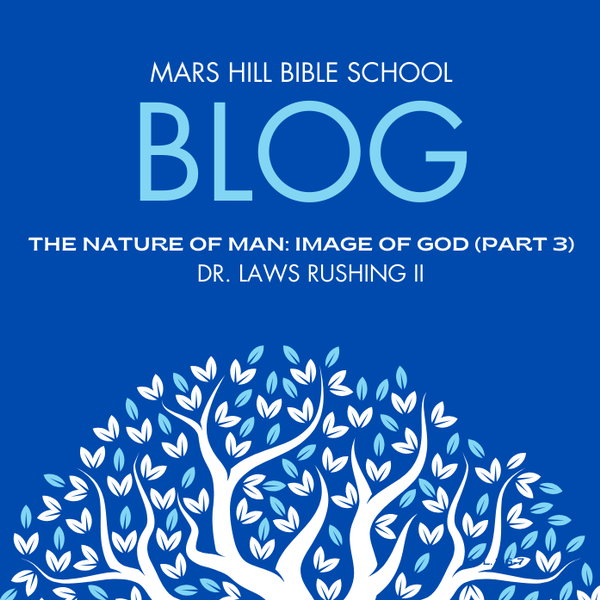MHBS Blog
The Nature of Man: Image of God (Part 3)

The metaphysical reality of free will is the basis of human identity, responsibility, and rationality. It is foundational to our spiritual nature and endowments. Rationality itself is an extension of our free will. We have the potential ability to adjudicate beliefs, thoughts, and actions formulated on thinking which is consistent and rational. We also can base our decisions on irrational forces such as emotions or fallacious thinking.
Rationality is based on several criteria. One of which is the idea of causation. The idea of causality is found in every science from math and science to the study of history. The idea of causality is assumed in Newton’s laws of motion to geometric and algebraic computation. Rationality is understanding the basis of causality in different arenas of thought. Medical doctors will observe and treat symptoms which imply causes sometimes even unseen in the human body whether it be organ failure or a bacterium. Our empirical testing has come a long way to where we can detect many illnesses, but diagnosis generally is a conclusion or inference based on evidence. So, rationality includes the idea of necessary and sufficient reasons for a result.
Many philosophers have concluded that rationality is a hallmark of a transcendent Creator. If the mind is not the primary dynamic of the universe, what would be the foundation for the intelligibility of the universe? And even beyond this, why would there be any rationality at all? The laws of thought are immaterial and universal. They were not created by mankind but discovered and articulated over time. The laws of thought dramatically argue with atheistic materialism which postulates a reality only observed and measured through scientific means.
A great pioneer of rationality was Aristotle, who was able to convey the principles of thought called the laws of identity, contradiction (non-contradiction), and excluded middle. He also introduced the ideas of induction which were later refined by Francis Bacon to become what is commonly called the scientific method.
Another framework for rationality is cohesion or consistency. Rationality is holding ideas and conclusions which are non-contradictory. A man cannot be a bachelor and married at the same time. These two contradictions cannot simultaneously exist in the same subject. Some have argued that the idea of God is somehow illogical. The strongest of such assertions is generally connected with the existence of evil or suffering in the world. However, this is not a logical contradiction within the same subject but two distinct identities. There is no logical contradiction in the Christian conception of God which is, God as supreme good and power, which would be the case, for a being, which is being itself. God is unconditioned.
Rationality can be compromised through fallacious reasoning. In other words, believing things because of faulty thinking processes. Consider the logical fallacy of begging the question, which asserts a premise without proper rationales. Or a circular argument which essentially repeats the premise in different words. People often attack a person instead of their intellectual position. All these and more are not rationally valid processes for beliefs.
God endowed humanity with rationality, and this reflects the nature of His being. His wisdom transcends our own. “Because the foolishness of God is wiser than men, and the weakness of God is stronger than men” (I Corinthians 1:25).
“For the Lord gives wisdom; From His mouth comes knowledge and understanding” (Proverbs 2:6). “Have you not known? Have you not heard? The everlasting God, the Lord, The Creator of the ends of the earth, neither faints nor is weary. His understanding is unsearchable” (Isaiah 40:8).
We also see in Scripture that Jesus uses rationality to communicate the message of God. Jesus reasons with the people when accused of miracles through Beelzebub by constructing an argument based on the principle that divided kingdoms fall (Matthew 12: 22-29). If He (Jesus) is casting out demons by the power of demons, then He is “dividing the kingdom” and thus undermining Himself.
Jesus also reasoned about the afterlife by recalling Moses and the burning bush. God revealed Abraham still had a covenant relationship despite being physically dead and is thus still living. This subtle argument was based on the tense of a verb! ‘Jesus answered and said to them, ‘Are you not therefore mistaken, because you do not know the Scriptures nor the power of God? For when they rise from the dead, they neither marry nor are given in marriage, but are like angels in heaven. But concerning the dead, that they rise, have you not read in the book of Moses, in the burning bush passage, how God spoke to him, saying, ‘I am the God of Abraham, the God of Isaac, and the God of Jacob’? He is not the God of the dead, but the God of the living. You are therefore greatly mistaken” (Mark 12:24-27).
Early evangelists would reason with their audiences in the proclamation of the Gospel. Stephen’s preaching was persuasive through wisdom, “Then there arose some from what is called the Synagogue of the Freedmen (Cyrenians, Alexandrians, and those from Cilicia and Asia), disputing with Stephen. And they were not able to resist the wisdom and the Spirit by which he spoke” (Acts 6: 9, 10). It is said of the Apostle Paul, “Then Paul, as his custom was, went in to them, and for three Sabbaths reasoned with them from the Scriptures” (Acts 17:2).
God has endowed humanity with rationality through free will and knowledge of thought itself. We are all trying to make sense of life and the Scriptures.
Rationality is the signature of God on the soul of man.
We can make decisions based on truth, reasoning, and consequence. This has ennobled man to accomplish amazing things spiritually and scientifically. This substantial characteristic is reflective of the image of God and enabled our dominion of the earth as primevally promised in Genesis.


.png)
